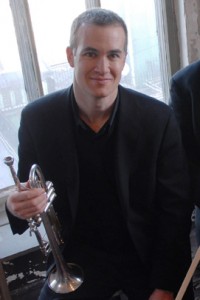- Sunday, September 28
St. Peter’s Church – FREE!
5pm Vespers Service with the American Brass Quintet.
Early Music Edited by Raymond Mase featuring works by Marenzio, Mazzi, Gabrieli, Cangiasi, Gastoldi and others.
FONT Award of Recognition to Raymond Mase.
How did you become a trumpet player?
My parents were both “band directors” so it was inevitable I would pick up an instrument. When they asked me “what instrument would you like to play, Louis”, I said “drums”. They paused, repeated the question, and I said “trumpet!”
Were there recordings in the beginning that drew you into the trumpet’s sound and possibilities?
My first recordings were of the Count Basie Band, and Maurice Andre – I continued to pair jazz and classical listening (and playing) well into my twenties. The recording that really inspired me to practice: Wynton Marsalis’s album “Carnaval”; an album of virtuoso cornet solos he did with the Eastman Wind Ensemble. I was 13 or 14 when I first heard that album, and just “had to do that!”
People often talk about how the trumpet is the hardest instrument to play. Do you feel this is true? What doesn’t the general public understand about playing the trumpet that you wish people would realize?
It does require regular attention to achieve mastery (or simply, consistency) – I have to remind my students of this, frequently, general public aside. Even the most accomplished players must be somewhat selfish; protective of their trumpet (or brass) time, in order to see patterns of consistency.
If you had to identify with one or two gurus, trumpeters or otherwise, who had the greatest impact on your musical journey to date, whom would they be?
My teachers – Tom Tressler and Derek Stratton for early inspiration. Andrew Classen, for routine. David Greenhoe for artistry and love of all things trumpet. Ray Mase and Mark Gould for polish, teaching myself, inspiration, uh, just about anything!
My colleagues – every player I’ve ever shared a stage with – I’ve learned from them all.
Collaboration, collaboration, collaboration. Brass chamber music requires you to listen, learn, and (hopefully) evolve as a musician and person.

